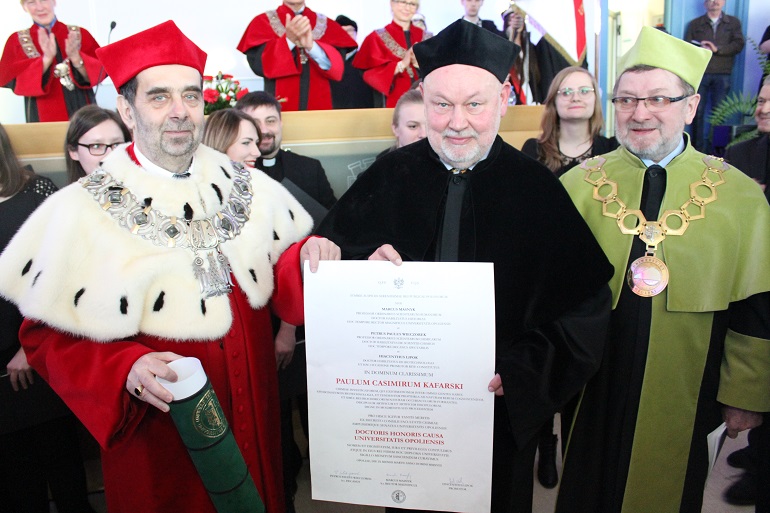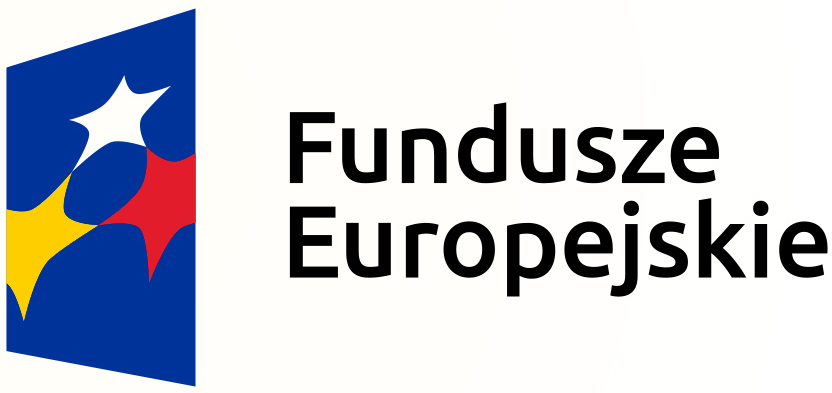University of Opole Day

We meet on the eve of the 24th anniversary of the founding
of the University of Opole, which took place on 10 March 1994; however, today's
festival is also a celebration of Polish chemistry - said Prof. Marek Masnyk,
Rector of the University of Opole, welcoming
the guests gathered in the Blue Hall, Collegium Maius.
The culminating point of the ceremony was the conferment of
the honorary doctorate to Professor Paweł Kafarski, a well-known chemist.
On March 9, 2018, on the occasion of the celebration of the University of Opole Day, the distinguished guests gathered in Collegium
Maius: prof. Paweł Kafarski with family and friends, rectors, vice-rectors and
deans from other Polish universities, former rectors of the UO,
representatives of the local authorities, Antoni Duda, MP, educational
superintendent Michał Siek, school principals, CEOs of Opole companies, the
senate of the UO, and members of the academic community.
All of guests were greeted by Rector Prof. Marek Masnyk, who
gave the occasional speech on the achievements of the University of Opole and
its future.
Disciple of Masters, Master to Disciples
The laudation in honour of Prof. Paweł Kafarski was
presented by Professor Jacek Lipok, who in conclusion said: - 'In the case of Professor
Paweł Kafarski, who, in his Renaissance approach to life sciences, is closest
to the methodology of chemistry, one can say that he has extraordinary
achievements in creating and studying new chemical entities for human benefit,
to mention only drugs acting as enzyme inhibitors and environmentally friendly
herbicides. Seeking to know the nature of things and things that create the
nature of chemical phenomena relevant for living organisms; from the molecular
level, through biochemistry, physiology and behaviour, to ecological relations,
he has established a true science school. The school, which participated in
exploring the possibility of using biotechnological processes to deactivate
environmental toxins and to create chemical combinations of highly beneficial
functional qualities. It is worth noting that our Honorary Doctor is not alone
in his efforts, as he is accompanied by collaborators, endeared by his
scientific charisma, professional ethics and worthy conduct.
I would also like to stress that Professor Kafarski's
impressive scientometric data is merely a starting point for describing his
position in the world of science. The real measure of his impact is the people
whose lives have been intertwined with his life. Masters, whom he remembers on
every occasion, and for whom he has become a partner in scientific discussion,
co-workers, whose role and achievements in joint projects he has always
emphasized, and numerous students for whom he has become the Master.
The student of the Masters, Master to Students, Man,
Teacher, Scientist, and since today also Doctor honoris causa of the University
of Opole - said Professor Lipok, finishing his laudation.
Flowers, congratulations and emotions
The text of the commemorative diploma for the honorary
doctor was read by Prof. Piotr Wieczorek, Dean of the Faculty of Chemistry. The
diploma was conferred by Prof. Marek Masnyk and Prof. Wieczorek.
After the speech of the honorary doctor the time came for
congratulations, flowers and emotions.
On behalf of the entire local government community, I would
like to extend my sincere congratulations and thanks to Professor Kafarski for
his contribution to the Polish and Opole science, for many years of his
cooperation with the Pedagogical College, and then with the University of
Opole. Congratulations to the University that the jubilee year was started with
the distinction of a chemist, since our region is associated with chemistry,' -
said Szymon Ogłaza, member of the voivodeship board.
The musical setting of the ceremony was provided by a vocal
group from the UO Faculty of Theology conducted Rev. Joachim Waloszek.
Professor Paweł Kafarski
Prof. Paweł Kafarski was born on 13 January 1949 in Gdańsk. In 1958 he moved to Zielona Góra, where he finished the Edward Dembowski Secondary School in 1966. In the same year, he was admitted to the Chemical Faculty of the Wrocław University of Technology, from which he graduated in 1971, and where he immediately started his academic career as a research-and-teaching assistant. A year later, he was admitted to a PhD programme and during his studies (1975) he went on a nine-month internship at the Marquette University in Milwaukee (USA), where, in Professor Sheldon E. Cremer's lab, he conducted research outside the scope of his doctoral thesis. After returning, in 1977, he defended his doctoral dissertation - Synthesis of peptides containing aminophosphonic acids, completed under the supervision of Prof. Przemysław Mastalerz. In the same year, he got a position of assistant professor at his home faculty. Professor Paweł Kafarski's further academic career, as he himself describes it, was typical - in 1990 he obtained the habilitation degree, and in 1998 the title of professor. Prior to his habilitation, he left for an internship (poste-rouge) at Ecole Nationale Superieure de Chimie in Montpellier, starting a long and fruitful cooperation with that university.
Prof. Kafarski's first research activities focused on the synthesis and examination of the physiological properties of phosphono peptides. He continued these studies with designing (also computer-aided), synthesising and examining chemical properties (structure, conformation, metal complexes) and biological activity of aminophosphonic acids - aminopeptidases. Prof. Kafarski was particularly interested in designing inhibitors of chosen enzymes, hoping to obtain drugs against such diseases as: cancer, malaria, stomach ulcers or tuberculosis. In recent years, he has been intensively searching for a new agent against osteoporosis, and one of the more than 200 aminomethylenobisphosphonates obtained in the process turned out to be quite promising in preclinical studies on sheep. Prof. Kafarski's other research interests concern organophosphorus xenobiotics in the natural environment, with a special focus on the identification of ways of biodegradation of these compounds by fungi and cyanobacteria. For some time now, he has also been interested in searching for chemical markers of varietal honeys. These studies are also of social importance, as one of their aims is to try to find a way of detecting the adulteration of sold honey.
He carried out a significant part of his research in cooperation with numerous scientists and research institutions in Poland and abroad, inter alia, Professor Giuseppe Forlani, University of Ferrara, Prof. Jean-Luc Pirat, Ecole Nationale Superieure de Chimie de Montpellier, Prof. Eric Oldfield, University of Chicago, and Prof. John Daltont, Sydney University of Technology.
He has participated in the implementation of many research projects, being the manager of at least 15 projects financed by the National Science Centre and 3 projects financed by the National Centre for Research and Development, which included one of the first commissioned projects: 'New eco-friendly agrochemicals’ or OPIG grant - Biotransformation for the pharmaceutical and cosmetics industry, and the project, implemented at Algae Labs and University of Opole, - Obtaining secondary metabolites from microalgae and cyanobacteria using an automated photobioreactor system.
Professor Kafarski is also present at the European forum - as a leader of one of the research groups in the COST (CN0802) programme European Phosphorus Science Network - PhoSciNet, and as an expert evaluating research tasks submitted within the ERA Net-Biotechnology project. He also organised the 18th International Conference on Phosphorus Chemistry in 2010.
He is a member of an international committee which opinions the awarding of the A. E. Arbuzov Prize by the President of the Republic of Tatarstan in Russia. This prize is the highest international award granted to chemists specialising in the chemistry of phosphorus compounds.
Professor Paweł Kafarski is a co-author of over 300 publications, which have been quoted in scientific literature nearly five thousand times (without self-citations), and the Hirsch index of his works is 33. One of his works has been cited more than 800 times (P. Kafarski, B. Lejczak, Phosphorus, Sulphur, Silicon and Related Elements, Abingdon 1990), one - more than 300, and a few others - almost 100 times. His works include 4 monographs, 22 chapters in books and two collective works edited by him. He has patented 13 inventions and reviewed more than 320 scientific papers.
Professor Kafarski has supervised 37 doctoral dissertations, including the ones in collaboration with the University of Montpellier (3), the University of the Basque Country in Vitoria (1), and Katholieke Hogeschool in Ghent (1). Five of his doctoral candidates have become professors: three at the Technical University of Wroclaw, one at the University of Brisbane, and one at the University of Ann Arbor, Michigan. He reviewed 37 professors' applications, 3 applications for honorary doctorates , 23 habilitation and 59 doctorate dissertations (including 6 foreign ones - Spanish, French and Hindu).
While working at the Wroclaw University of Technology, he actively participated in the life of his home university, serving as Director of the Institute of Organic and Physical Chemistry, Vice-Dean, and then Dean of the Chemical Faculty, a member of the Senate of the Wroclaw University of Technology. He has been the Head of the Department of Bioorganic Chemistry since 1992.
In 1982, Professor Kafarski was also employed at the University of Opole, where, together with Dr Piotr Wieczorek, he created the agrobiochemistry programme, serving for one term as Deputy Director of the Institute of Chemistry for Agrobiochemistry. He worked at the University of Opole until 2015, and supervised 7 doctoral dissertations.
He was Vice-President and President of the Polish Chemical Society, and he is a member of the Central Commission for Academic Degrees and Titles. He was also a member of the Committees of Chemistry and Biotechnology of the Polish Academy of Sciences for several terms. He is a member of the Polish Academy of Learning and an expert for the European ERA-NET agency.
Professor Kafarski has always been fascinated with teaching, which is confirmed by an academic textbook published by the PWN - Chemia Bioorganiczna [Bioorganic Chemistry], written together with Prof. Barbara Lejczak. He is also a co-author of two textbooks published by the Higher School of Pedagogy in Opole and the University of Opole. His wise, full of erudition and witty lectures are widely known not only to students of the Wroclaw University of Technology or the University of Opole. When asked by doctoral candidates to give a lecture at a local symposium, Prof. Kafarski is always ready to travel even half of Poland just not to disappoint a group of young researchers.
Professor Kafarski's most important and highly valued rewards include the Medal of Jan Hanus awarded by the Czech Chemical Society, the Medal of Włodzimierz Trzebiatowski (his first academic teacher) awarded by the Wroclaw University of Technology, and the honorary membership of the Slovak Chemical Society. He also appreciates the professorial subsidy Mistrz (Master) obtained from the Polish Science Foundation.




